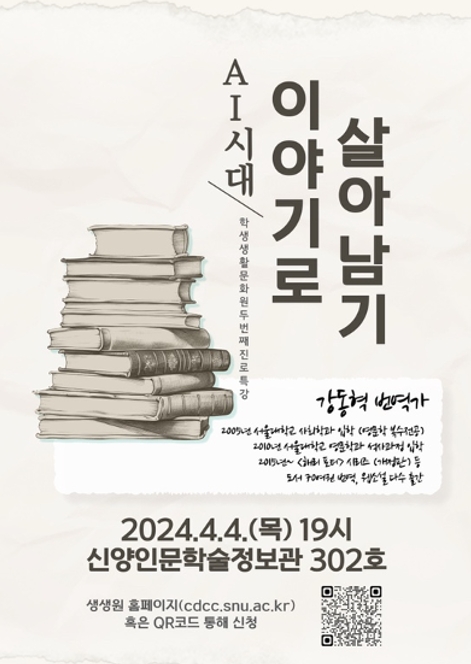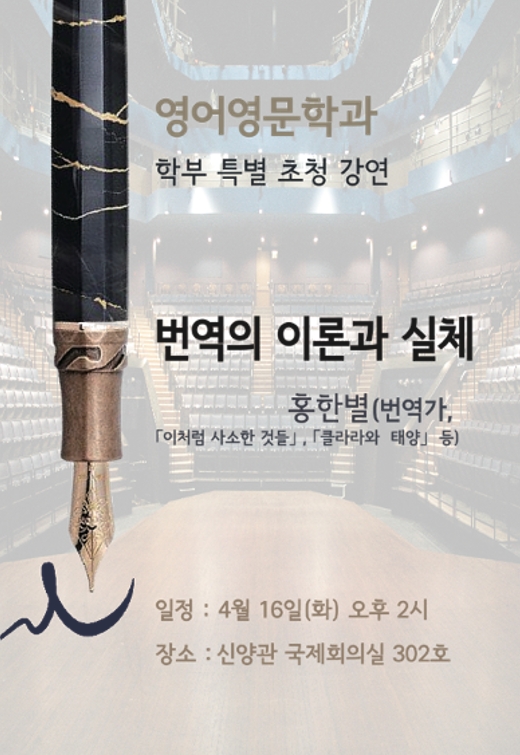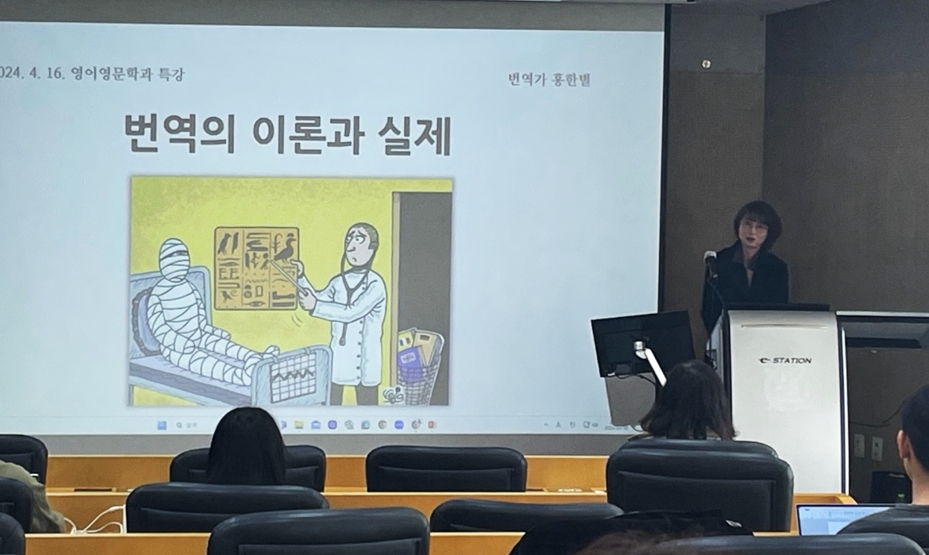With the strong presence of large language model (LLM) programs such as ChatGPT and DeepL in the cultural zeitgeist, questions concerning the prospects of the translation industry in the face of artificial intelligence (AI) have been continuously raised in the mainstream. In response to this interest, SNU hosted two talks concerning the particulars of translation and AI called “Surviving through Narratives in the Age of AI” and “The Theory and Practice of Translation.”

Poster for “Surviving through Narratives in the Age of AI”
“Surviving through Narratives in the Age of AI” was hosted on April 4 by the SNU College of Humanities’ Career Development and Counseling Center as part of their special career lecture series. In this lecture series, SNU graduates are invited back to campus to discuss their experiences working in a particular field and share their knowledge with current students. SNU alumni and renowned translator Kang Dong-hyuk, famous for his English-to-Korean translation of the Harry Potter series and the novel Project Hail Mary, was invited to deliver the translation talk in the Shinyang Humanities Hall.
Kang expounded on the many intricacies involved in the life of a translator. Contrary to the public perception of the translation industry, English-to-Korean translators fulfil a myriad of tasks beyond the mere translation of works. In reality, translators function like literary agents who work intimately with editors in the publication of books. As such, they are pivotal in drafting translation proposals for literary works that have the potential to be received well in the Korean market and penning promotional work for said translated pieces. Kang opined his belief that the projected cynicism for translation to be a dying industry altogether is a premature conclusion. As translators are crucial in the process of content creation, it is difficult to entirely dismiss the importance of their jobs.
Kang also clarified that although the public understands these LLMs as anthropomorphized versions of computers analogous to human intelligence, they are not interchangeable with the translators who work in the literary field. Literary translations require an intimate understanding of cultural nuances, different dialects, discourse relations, internet lingo and many other factors that programs with data-driven pattern-finding computations will have difficulty parsing through. He further noted that though LLMs can be used in the initial stages of brainstorming possible translations, human sensibilities are required in the final stages of fine-tuning the translation such that it sounds natural and refined.

Poster for “The Theory and Practice of Translation”
On April 16, the Department of English Language and Literature at SNU hosted another talk on translation titled “The Theory and Practice of Translation” led by acclaimed translator Hong Han-byeol, known for her English-to-Korean translations of novels such as Klara and the Sun and Small Things Like These.
The throughline in Hong’s talk was that the translation of texts is not a straightforward mechanical procedure as is often the public conception. An accurate and meticulous translation needs to embody cultural differences, the evolution of languages from the past to the present, and contextual clues present within different types of texts. Per Hong’s words, translation is an act of rewriting the text after reading it. In the translation world, “reading” refers to understanding the hidden depths of the source-language text and “rewriting” refers to conveying said interpretation competently and transferring it to the target-language text. Both these enterprises are crucial to producing a good translation. Hong contends that while LLMs may succeed in “reading” texts and algorithmically predicting possible outputs, they are less competent in the act of “rewriting” because they fail to account for contemporary trends in language evolution and various cross-cultural nuances.

Hong Han-byeol presenting her lecture
Hong also addressed an important point in how translation strategies are implemented differently according to the different translation markets and how LLMs are lackluster in sufficiently addressing these translation niches. For instance, in the United States, the translation industry tends towards a “sense-for-sense” philosophy. Domestication becomes key as culturally anchored terms from the source language are changed to conform to the linguistic-cultural perceptions of the target language market. Words and phrases that seem unfamiliar or “other” are revised to seem more familiar to native English readers such that the novel can be easily assimilated into their literary convention. The authority of the original text is diminished to some extent as translators have the freedom to truncate certain parts of the text and append more information to others in an attempt to make the text seem less like a translated piece of literature. Meanwhile, the Korean translation industry tends towards a “word-for-word” philosophy. The foreignization of the source text is a more highly regarded translation strategy as it remains faithful to the original text. Hong hypothesized that this was because Koreans were more receptive to the idea of translated texts due to exposure to foreign texts from a young age. Though it is difficult to cast value-judgement statements on the superiority of different translation strategies, we can certainly see how the cultural differences that lie inherent in translation markets are another aspect that makes it difficult for LLMs to completely replace translation industries.
Both talks helped illuminate information on the profession of translation and the complexities inherent to the translation industry. All students who attended the talks were satisfied with a more thorough understanding of how LLMs could not yet supplant the important work of human translators. As always, SNU is up to speed with topical issues and consistently seeks to address any curiosities their students may have with the diverse talks and lectures they hold throughout the year.
Written by Hyun Kyung Jung, SNU English Editor, jhyunk@snu.ac.kr

